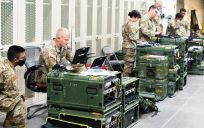The U.S. Air Force is focused on eliminating legacy policies around tech adoption and continued telework in a new initiative called “Operation Flamethrower.”
Since widescale telework began in March, the Air Force has been able to mitigate its connectivity and security issues so service members can work from home. Over time, connectivity has continued to improve their ability to work remotely in a productive and secure manner, to the point that they actually have a better user experience at home than in the Pentagon.
Now, the challenges around remote work is not so much a technology issue but a policy one, said Rob Beutel, the Air Force’s Deputy Chief Information Technology Officer.
“There are a lot of policies that, when they were written, made a lot of sense. But they’re 10, 15, 20 years old, and things change quickly, especially in this day and age in IT and cyber,” Beutel said at GovLoop’s online training Thursday.
“Operation Flamethrower” aims to “ruthlessly attack” policies and guidance that cause unnecessary hindrance to the Air Force’s performance, Beutel said.
The effort isn’t entirely new. There were similar initiatives that tackled outdated policies before, but this one is uniquely supported enthusiastically by senior leaders, likely because the pandemic has revealed how impactful tech policy hindrances can be when agile adoption is urgent. A task force has been created to specifically work on reviewing policies and eliminating outdated ones.
Legacy policies can get in the way of an agency’s performance by blanketing a generic “no” to otherwise useful technologies for no other reason than that the rules say so. It’s not that government leaders are averse to new and improved solutions — it’s that policies, or “pieces of paper,” as Beutel put it, unnecessarily impedes their efforts.
Hearing the commercial sector’s tech success stories can mobilize interest and action around agile tech policies in the defense community, especially when leaders see industry doing things that government can’t do but wants to do, Beutel said.
This kind of cross-sector storytelling is valuable for sharing telework lessons too. That’s the approach Citrix takes, a software company that has had remote work capabilities for its own workforce for over 30 years, said Jose Arvelo, Federal Sales Engineering Manager at Citrix Systems Inc., another panelist at GovLoop’s online training Thursday.
To help government customers, Citrix shares its internal telework experiences and lessons with agencies beyond the technology aspects. All kinds of organizations in both government and industry are dealing with topics like employee engagement and inclusive culture-building in remote work, so the stories they can swap with one another are a rich resource to pull lessons from.
Organizations need to continue learning from this crisis, whether that’s around adopting more agile policies or instituting telework best practices. That way, if and when the next crisis comes around, they’re better equipped.
“We can’t let our guard down again,” Arvelo said.
This online training was brought to you by:





Leave a Reply
You must be logged in to post a comment.